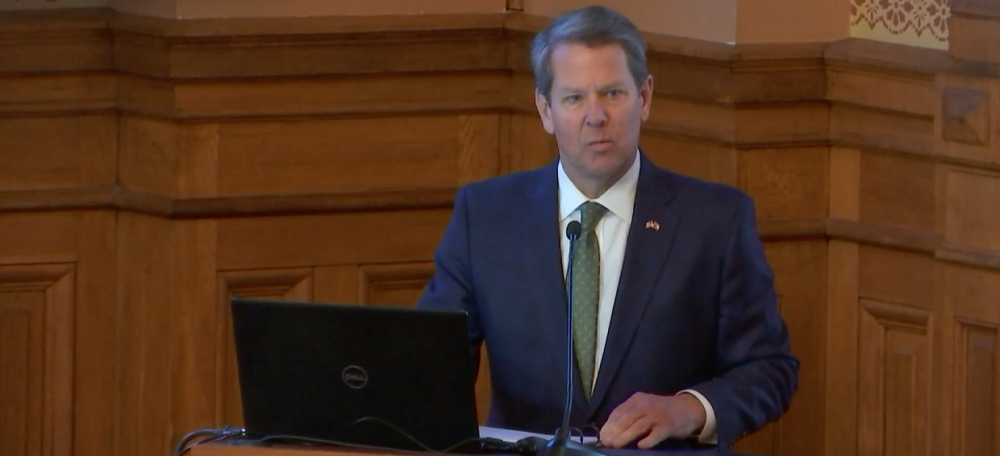
Section Branding
Header Content
Georgia Today: Training center task force; African American family history project; Too hot to work
Primary Content
On the Thursday, Aug. 3 edition of Georgia Today: A task force recommends ways to proceed on Atlanta's controversial public safety training center; a project in Macon aims to fill gaps in African American family heritage; and how hot is TOO hot to work outdoors? Our series on working in the heat continues.

Peter Biello: Welcome to the Georgia Today podcast from GPB News. Today is Thursday, Aug. 3. I'm Peter Biello. On today's episode, a task force recommends ways to proceed on Atlanta's controversial Public Safety Training center. A project in Macon aims to fill gaps in African American family heritage. And how hot is too hot to work outdoors? Our series on Working in the Heat continues. These stories and more are coming up on this edition of Georgia Today.

Story 1:
Peter Biello: Gov. Brian Kemp is telling state agencies they can request 3% budget increases in the coming fiscal year. The instruction sent to agency heads yesterday come as state finances remain buoyed by strong revenues and a massive budget surplus. One Georgia budget analyzing nonprofit says despite spending increases, state lawmakers are still leaving billions of dollars in the bank. GPB's Ellen Eldridge has more on a budget review released yesterday by the Georgia Budget and Policy Institute.
Ellen Eldridge: The GBPI says Georgia's overall state reserves going into fiscal year 2024 are expected to be above $16 billion. CEO Staci Fox says the amount is unprecedented. And while this may appear to be a strong fiscal position for the state, the money comes from taxpayers.
Stacy Fox: These are dollars that belong to Georgians that should be supporting the needs of Georgians, not withheld due to out-of-touch budgeting practices that are strangling resources and undermining economic stability.
Ellen Eldridge: Fox says Georgia has the resources to create a more inclusive and equitable economy and society; it's simply a matter of political will. For GPB News, I'm Ellen Eldridge.

Story 2:
Peter Biello: Information from a December 2020 meeting of the Georgia Senate was mentioned in Tuesday's federal indictment of former President Donald Trump. A Georgia state senator attended that gathering and spoke to GPB's Sarah Kallis.
Sarah Kallis: Sen. Elena Parent, said she was unaware that Rudy Giuliani would attend the Senate Judiciary Subcommittee meeting to advocate for Trump's claims of election fraud in Georgia. Parent said his presence made her realize the gravity of the situation and that she and her family received death threats for weeks because of her questions.
Elena Parent: I did my job the way I do every day, and this issue is just so high-profile and so many people across the country had been taken in by these lies that it was like a bomb got dropped on my life.
Sarah Kallis: Meanwhile, a Fulton County grand jury is expected to issue indictments soon in a separate case involving efforts to overturn Georgia's 2020 election. For GPB News, I'm Sarah Kallis.
Story 3:
Peter Biello: Fulton County Commissioners approved a $4 million settlement yesterday with the family of a 36-year-old man who was found dead and covered in bedbugs at the Fulton County Jail last September. The commission voted unanimously to approve the settlement with LaShawn Thompson's family. Thompson's death led the U.S. Department of Justice to investigate conditions at the jail. Commissioners yesterday also approved a resolution asking the county to find ways to finance a new jail. On the same day, the Fulton County Sheriff's Office announced an inmate died at the jail late Monday. Officials say 40-year-old Montay Stinson had no obvious signs of injury and an autopsy will be done to determine the cause of death.
Story 4:
Peter Biello: A task force created by Atlanta Mayor Andre Dickens has submitted its recommendations for how to proceed with construction of a planned public safety training center in an Atlanta forest. The report offers more than 100 recommendations, including ecological restoration and protections from future development. Opponents are trying to stop the center from being built, partly out of environmental concerns, and are collecting signatures to try to force a referendum on it in November.

Story 5:
Peter Biello: Many African Americans are missing crucial parts of their family history because of gaps in their genealogy created by enslavement. A Macon project is filling in some of those gaps by putting slavery transaction records into a database available to the public. GPB's Eliza Moore reports.
Eliza Moore: A new exhibit at the Tubman Museum in Macon showcases the research of the Enslaved People project. Chester Fontenot Jr., the director of the Africana Studies program at Mercer University, played a large role in the research. He says it's important for the public to have access to these records.
Chester Fontenot Jr.: To be able to construct their identity and to be at peace, at least with your own family, and kind of put flesh and bones on your ancestors.
Eliza Moore: Fontenot says these documents are a part of Bibb County's history.
Chester Fontenot Jr.: Now it provides primary source materials, you know, for them to fill out the narrative for what actually happened to people of African descent in Bibb County during slavery.
Eliza Moore: Erica Woodford, Bibb County Superior Court clerk, originally discovered the records and established the team with Fontana.
Erica Woodford: But I think this is a great way to dialog about our shared history so that we can have a better future.
Eliza Moore: The exhibit contains photos, documents and an original deed book from the courthouse. It will be on display through Aug. 14. For GPB News, I'm Eliza Moore in Macon.
Story 6:
Peter Biello: Five Georgia organizations have signed on to a national call for congressional leaders to denounce lawmakers who use white supremacist and anti-immigrant rhetoric. More than 160 religious, civil rights and immigrant advocacy groups sent a letter to U.S. House and Senate leaders yesterday ahead of today's fourth anniversary of the mass shooting in El Paso, Texas, that killed 23 people. In the letter, the groups argue that using words like "invasion" and "invaders" to refer to immigrants and immigration can lead to violence from marginalized communities. They're asking leaders from both parties to denounce such language and encourage members to refrain from using it.

Story 7:
Peter Biello: Macon native and country music star Jason Aldean is set to take the stage in his home state this weekend as controversy swirls around his biggest hit yet. Aldean's "Try That in a Small Town" is currently the No. 1 single on Billboard's Hot 100 music chart. The song is experiencing exponential growth following claims and counterclaims that the song and its new video promote white supremacy and violence. Aldean is scheduled to perform on Saturday at Atlanta's Lakewood Ampitheater.
Story 8:
Peter Biello: We've all felt it: This summer has been shockingly hot. What does that mean for the people who take out our trash, clean our yards and deliver our mail? In Part 2 of our series on heat, GPB's Sofi Gratas explores what some employers are doing to mitigate the damage he can cause to the many essential workers left vulnerable to hazardous heat.

Sofi Gratas: At 6:30 a.m., trash collector Chris Powell is already on the first leg of his route. He’s one of over 100 trash collectors employed by Ryland Environmental. The company has contracts with cities from Macon down to the Florida border. Powell hops on and off the back of a trash truck as it makes its way through different neighborhoods.
Chris Powell: Every morning the job supplies a deep freezer full of bottled water. And you just come in and grab whatever you may need.
Sofi Gratas: Those frozen water bottles — the workers call them bricks — will melt throughout the day, giving them a constant supply of water.
Chris Powell: Drivers, they're always saying, "hey, you, take your break." You know, as you tend to sweat, you know, you you can kind of feel, I guess, you need some water
Sofi Gratas: It’s a hard job. Like when it takes three guys to lift a trash can full of tile. During a 10-hour shift where temperatures averaged in the mid 80s, Powell lost 3 gallons of sweat. To make up for the salts lost from his body, Powell would need to drink thirty-five 20-ounce Gatorade bottles.
Chris Powell: Just a typical day. I mean, you sweat, you drink you some water. But I would not have thought I needed that much water.
Sofi Gratas: Even though his boss is a stickler about breaks and heat safety training, there’s no way Powell, as an essential worker helping keep a major city clean, can avoid the heat while he’s working, says Powell’s supervisor Maurice Dillard.
Maurice Dillard: I mean, it just has to be done regardless of whether it's 112 outside or 120 outside or whether it's 54 degrees outside.
Sofi Gratas: But lead labor agencies say in many parts of the country, it will likely get too hot to work safely.There is no federal law yet to protect people from having to work in dangerously hot conditions. BUT a federal heat standard — BASIC RULES FOR SAFETY — are expected within the next decade. In the meantime, 46 states, including Georgia, don't have their own outdoor heat protections either. So workers have no pathway for most heat-related complaints. Across sectors, federal labor agencies report an average of 38 heat-related deaths a year. Juley Fulcher advocates for worker safety with the group Public Citizen. She says heat can cause people to die from a fall, mishandling machinery or from a heart attack. That’s why she says heat-related deaths are undercounted.
Juley Fulcher: What we're looking at is something that's probably closer to 600 to 2,000 a year are dying from heat stress on the job.
Until they craft the federal heat standard, the Occupational Safety and Health Administration says the agency is prioritizing more workplace inspections and issuing citations.
Brian Liddell: We can issue citations under what we call our our general duty clause.
Sofi Gratas: The general duty clause covers hazardous conditions that don’t have their own standard, says Brian Lidell with OSHA’s health response team. But it’s largely up to employers to create safe working conditions while an official heat standard is underway.
Brian Liddell: We just don't have enough compliance officers to get into every worksite everywhere. It's just not — it's not feasible. And so that's always a challenge.
Sofi Gratas: Except for employers, it shouldn’t be a challenge to keep workers safe, says Juanita Constible with the Natural Resources Defense Council.
Juanita Constible: It’s such a silly, preventable issue. It's not like we don't understand how to keep people safe from heat. This is not rocket science. It's not brain surgery.
Sofi Gratas: Labor agencies and others like the Centers for Disease Control already have their own heat protection guidelines: Stay hydrated. Take breaks in cool places. Wear loose-fitting clothing. Acclimatize before starting outdoor work. Don't ignore symptoms of heat illness. By doing these things, the human body can largely tolerate temperatures up to 90 degrees fahrenheit while working, although OSHA says anything past 80 degrees is dangerous. James Lanier of Ryland Environmental says it’s quite simple — protect your workers like you would your family.
James Lanier: Would you send your son out on a truck like that without an air conditioner in it or on the back of a truck without water all day or something like that, or without the access to get that stuff? I wouldn't.
Sofi Gratas: Lanier says workers get three breaks, including lunch, with more if it’s hotter outside. The company pays for protective equipment, water, and for employers to come in early for worker safety training. And Lanier says if heat waves get as bad as predicted, he’d implement more safety measures, like using automated trucks during the hottest parts of the day.
James Lanier: While OSHA serves a wonderful purpose, it's not our guiding factor behind it. It's just the right thing to do.
Sofi Gratas: After what he already spends on safety measures, Lanier says they’ve only had to send a worker home for heat-related illness. So far, several comments from busiiness organizations have been in favor of a national heat standard. But organizations representing lumber workers, farmers, construction workers and the like seem concerned about a rule being cumbersome to follow. Many, like Ryland Environmental, say they’re already protecting their workers. So why should OSHA butt in? Yet, some workers in the private sector have to go to extreme lengths to get protections.
Driver for the United Parcel Service, Barkley Wimpee, starts his day around 9 a.m.
Barkely Wimpee: This route has more dogs per capita than any other route at UPS, period.
Sofi Gratas: His route near the North Georgia mountains is windy with lots of long driveways.
Barkely Wimpee: [HEAVY BREATHING]
Sofi Gratas: Wimpey hauls packages out of his truck from medication to furniture. One of his regular customers checks in.
Customer: Need some water or anything, brother?
Barkely Wimpee: Man, I'm doing okay right now. I appreciate it.
Sofi Gratas: Like every UPS driver, Wimpee has no air conditioning in his brown, metal truck, just two fans blowing luke-warm air. He says it can feel like an oven.
Barkely Wimpee: It's because there's no — there's nowhere for us to go. There's no way to escape it. There's no way to get away from it. You can try to stop and park, you know, maybe under a shade tree or something to that effect. But you're —you're still in it.
Sofi Gratas: Conditions can get so bad that last summer, Wimpee suffered a heatstroke on the job. At the emergency room, his temperature reached over 100 degrees.
Barkely Wimpee: It makes it very difficult to to deal with the heat the next year. Once it happens one time. I can't explain it. Once it happens one time, it will happen again. So it's — it's tough.
Sofi Gratas: Putting air conditioners in the hundreds of thousands of UPS vans across the country was one of several demands made by the UPS International Brotherhood of Teamsters ahead of a planned strike this month. On July 25, the Teamsters reached negotiations with the company on wage increases, equal pay, time off and, AC. The company plans to outfit trucks with air conditioners as soon as 2024. For GPB News, I’m Sofi Gratas.
Story 9:
Peter Biello: In sports, the Atlanta Braves play the Chicago Cubs tomorrow after coming off a 12 to 5 victory over the Los Angeles Angels yesterday. The big news is that pitcher Max Fried, who has been on the injured list for nearly three months, will start tomorrow's game against the Cubs.
Thanks for choosing Georgia Today to keep yourself informed about what's going on in Georgia. We do appreciate you tuning in. And if you want to learn more about any of these stories, visit our website, GPB.org/news. We'll be back again tomorrow with all the top stories in the state. The best way to make sure you're here for it is to subscribe to Georgia Today. So if this is a one-off listen for you, we hope you will subscribe and come back again and again and stay informed about what's going on in Georgia. If you've got feedback, we'd love to hear from you. Email us. The address is GeorgiaToday@GPB.org. I'm Peter Biello. Thanks again for listening. We'll see you tomorrow.
---
For more on these stories and more, go to GPB.org/news



